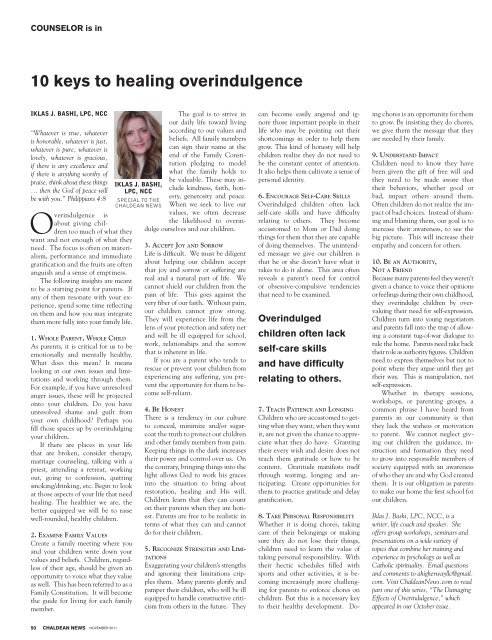NOVEMBER 2011
You also want an ePaper? Increase the reach of your titles
YUMPU automatically turns print PDFs into web optimized ePapers that Google loves.
COUNSELOR is in<br />
10 keys to healing overindulgence<br />
Iklas J. Bashi, LPC, NCC<br />
“Whatever is true, whatever<br />
is honorable, whatever is just,<br />
whatever is pure, whatever is<br />
lovely, whatever is gracious,<br />
if there is any excellence and<br />
if there is anything worthy of<br />
praise, think about these things<br />
… then the God of peace will<br />
be with you.” Philippians 4:8<br />
Overindulgence is<br />
about giving children<br />
too much of what they<br />
want and not enough of what they<br />
need. The focus is often on materialism,<br />
performance and immediate<br />
gratification and the fruits are often<br />
anguish and a sense of emptiness.<br />
The following insights are meant<br />
to be a starting point for parents. If<br />
any of them resonate with your experience,<br />
spend some time reflecting<br />
on them and how you may integrate<br />
them more fully into your family life.<br />
1. Whole Parent, Whole Child<br />
As parents, it is critical for us to be<br />
emotionally and mentally healthy.<br />
What does this mean? It means<br />
looking at our own issues and limitations<br />
and working through them.<br />
For example, if you have unresolved<br />
anger issues, these will be projected<br />
onto your children. Do you have<br />
unresolved shame and guilt from<br />
your own childhood? Perhaps you<br />
fill those spaces up by overindulging<br />
your children.<br />
If there are places in your life<br />
that are broken, consider therapy,<br />
marriage counseling, talking with a<br />
priest, attending a retreat, working<br />
out, going to confession, quitting<br />
smoking/drinking, etc. Begin to look<br />
at those aspects of your life that need<br />
healing. The healthier we are, the<br />
better equipped we will be to raise<br />
well-rounded, healthy children.<br />
2. Examine Family Values<br />
Create a family meeting where you<br />
and your children write down your<br />
values and beliefs. Children, regardless<br />
of their age, should be given an<br />
opportunity to voice what they value<br />
as well. This has been referred to as a<br />
Family Constitution. It will become<br />
the guide for living for each family<br />
member.<br />
Iklas J. Bashi,<br />
LPC, NCC<br />
special to the<br />
chaldean news<br />
The goal is to strive in<br />
our daily life toward living<br />
according to our values and<br />
beliefs. All family members<br />
can sign their name at the<br />
end of the Family Constitution<br />
pledging to model<br />
what the family holds to<br />
be valuable. These may include<br />
kindness, faith, honesty,<br />
generosity and peace.<br />
When we seek to live our<br />
values, we often decrease<br />
the likelihood to overindulge<br />
ourselves and our children.<br />
3. Accept Joy and Sorrow<br />
Life is difficult. We must be diligent<br />
about helping our children accept<br />
that joy and sorrow or suffering are<br />
real and a natural part of life. We<br />
cannot shield our children from the<br />
pain of life. This goes against the<br />
very fiber of our faith. Without pain,<br />
our children cannot grow strong.<br />
They will experience life from the<br />
lens of your protection and safety net<br />
and will be ill equipped for school,<br />
work, relationships and the sorrow<br />
that is inherent in life.<br />
If you are a parent who tends to<br />
rescue or prevent your children from<br />
experiencing any suffering, you prevent<br />
the opportunity for them to become<br />
self-reliant.<br />
4. Be Honest<br />
There is a tendency in our culture<br />
to conceal, minimize and/or sugarcoat<br />
the truth to protect our children<br />
and other family members from pain.<br />
Keeping things in the dark increases<br />
their power and control over us. On<br />
the contrary, bringing things into the<br />
light allows God to work his graces<br />
into the situation to bring about<br />
restoration, healing and His will.<br />
Children learn that they can count<br />
on their parents when they are honest.<br />
Parents are free to be realistic in<br />
terms of what they can and cannot<br />
do for their children.<br />
5. Recognize Strengths and Limitations<br />
Exaggerating your children’s strengths<br />
and ignoring their limitations cripples<br />
them. Many parents glorify and<br />
pamper their children, who will be ill<br />
equipped to handle constructive criticism<br />
from others in the future. They<br />
can become easily angered and ignore<br />
those important people in their<br />
life who may be pointing out their<br />
shortcomings in order to help them<br />
grow. This kind of honesty will help<br />
children realize they do not need to<br />
be the constant center of attention.<br />
It also helps them cultivate a sense of<br />
personal identity.<br />
6. Encourage Self-Care Skills<br />
Overindulged children often lack<br />
self-care skills and have difficulty<br />
relating to others. They become<br />
accustomed to Mom or Dad doing<br />
things for them that they are capable<br />
of doing themselves. The unintended<br />
message we give our children is<br />
that he or she doesn’t have what it<br />
takes to do it alone. This area often<br />
reveals a parent’s need for control<br />
or obsessive-compulsive tendencies<br />
that need to be examined.<br />
Overindulged<br />
children often lack<br />
self-care skills<br />
and have difficulty<br />
relating to others.<br />
7. Teach Patience and Longing<br />
Children who are accustomed to getting<br />
what they want, when they want<br />
it, are not given the chance to appreciate<br />
what they do have. Granting<br />
their every wish and desire does not<br />
teach them gratitude or how to be<br />
content. Gratitude manifests itself<br />
through waiting, longing and anticipating.<br />
Create opportunities for<br />
them to practice gratitude and delay<br />
gratification.<br />
8. Take Personal Responsibility<br />
Whether it is doing chores, taking<br />
care of their belongings or making<br />
sure they do not lose their things,<br />
children need to learn the value of<br />
taking personal responsibility. With<br />
their hectic schedules filled with<br />
sports and other activities, it is becoming<br />
increasingly more challenging<br />
for parents to enforce chores on<br />
children. But this is a necessary key<br />
to their healthy development. Doing<br />
chores is an opportunity for them<br />
to grow. By insisting they do chores,<br />
we give them the message that they<br />
are needed by their family.<br />
9. Understand Impact<br />
Children need to know they have<br />
been given the gift of free will and<br />
they need to be made aware that<br />
their behaviors, whether good or<br />
bad, impact others around them.<br />
Often children do not realize the impact<br />
of bad choices. Instead of shaming<br />
and blaming them, our goal is to<br />
increase their awareness, to see the<br />
big picture. This will increase their<br />
empathy and concern for others.<br />
10. Be an Authority,<br />
Not a Friend<br />
Because many parents feel they weren’t<br />
given a chance to voice their opinions<br />
or feelings during their own childhood,<br />
they overindulge children by overvaluing<br />
their need for self-expression.<br />
Children turn into young negotiators<br />
and parents fall into the trap of allowing<br />
a constant tug-of-war dialogue to<br />
rule the home. Parents need take back<br />
their role as authority figures. Children<br />
need to express themselves but not to<br />
point where they argue until they get<br />
their way. This is manipulation, not<br />
self-expression.<br />
Whether in therapy sessions,<br />
workshops, or parenting groups, a<br />
common phrase I have heard from<br />
parents in our community is that<br />
they lack the wahess or motivation<br />
to parent. We cannot neglect giving<br />
our children the guidance, instruction<br />
and formation they need<br />
to grow into responsible members of<br />
society equipped with an awareness<br />
of who they are and why God created<br />
them. It is our obligation as parents<br />
to make our home the first school for<br />
our children.<br />
Iklas J. Bashi, LPC, NCC, is a<br />
writer, life coach and speaker. She<br />
offers group workshops, seminars and<br />
presentations on a wide variety of<br />
topics that combine her training and<br />
experience in psychology as well as<br />
Catholic spirituality. Email questions<br />
and comments to ahigherwayllc@gmail.<br />
com. Visit ChaldeanNews.com to read<br />
part one of this series, “The Damaging<br />
Effects of Overindulgence,” which<br />
appeared in our October issue.<br />
50 CHALDEAN NEWS <strong>NOVEMBER</strong> <strong>2011</strong>

















